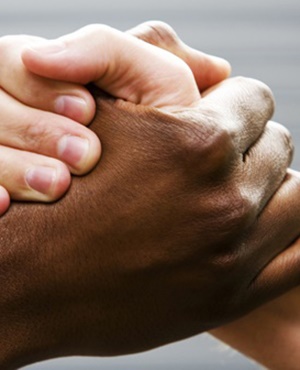
In the week before the 60th commemoration of the Sharpeville massacre and the 24th anniversary of the adoption of the Constitution, the Anti-Racism Network of SA challenges us to take stock and recommit ourselves to the struggle against racism.
This is necessary because it is dangerous to underestimate the length, the breadth and the depth of racism.
Racism has a long history
Without trying to identify an exact starting point, it must be said that racism has been an integral part of the economics and politics of European modernity.
The colonial conquest of the Americas, Africa and Asia was driven by a European sense of white superiority and exceptionalism, which included the right to occupy land through military force, take possession of natural resources, and buy and sell human beings as slaves.
When facing the challenge of racism, we are not confronted merely with the 46 years of legalised racism by a totalitarian apartheid state (from 1948 to 1994), but with more than five centuries of colonialism (since 1492), in which racism was one of the key driving forces as it spread its influence across the globe.
We should not imagine that we will get rid of racism overnight.
Racism has a wide-reaching effect
Racism has infected every aspect of society in South Africa.
One way to underestimate racism is to focus only on racist incidents, the use of insulting words and gestures that humiliate another person or group on the basis of their alleged racial characteristics.
Such incidents are sometimes angry outbursts but often they are instances of ice-cold disgust rather than red-hot anger.
We should not think that racism erupts only occasionally in such incidents. It is a system that is there all the time, under the surface, often carefully hidden or disguised, but nevertheless shaping attitudes and actions.
These structural or systemic aspects of racism affect everyone in society, since they racialise our identities as black, white, coloured and Indian.
All of us internalise racialised self-understandings as we grow up, whether we like it or not, whether we are aware of it or not, since our society is shaped by residential areas, schools and religious organisations that are still predominantly racial in character and where the stories we tell about ourselves and others regularly refer to people in racial terms.
These underlying self-understandings produce the racist incidents at the surface level which were identified earlier.
Such eruptions are triggered more regularly when there is economic decline, rampant crime, political uncertainty or ecological threat. This partly explains the resurgence of racist incidents.
The biggest damage done by racism doesn’t make the newspapers; it is the silent fact of grinding poverty, family disruption, self-doubt and anger caused in the minds of poor black communities by the deep (and deepening) inequality of our society.
Racist social and economic structures literally kill, since they treat some people as less than human: Some people count and others don’t (or not as much).
These underlying (often invisible or unacknowledged) societal structures are the sources of the racist confrontations and the racist suffering around us. But they are not the deepest problem we have with racism.
Racism has deep sources
The underlying societal structures that make up a racist system did not drop from the sky.
While taking shape during centuries of colonialism and apartheid they were justified by philosophies, world views and theologies that gave them legitimacy and credibility in the eyes of the white colonisers.
Justifying narratives like “civilising the savages” or “bringing light to darkest Africa” reveal an underlying world-view of white supremacy which soothed the consciences of those who were buying and selling slaves and (after the abolition of slavery) paying people starvation wages on farms or in mines and factories.
Christian churches in South Africa developed theologies that either justified the racist policies or treated them as unimportant (since they did not want to “get involved in politics” and focused instead on “getting people into heaven”).
However, there were also hard-line capitalists who justified their exploitative labour practices without reference to religious ideas.
The first pass laws in South Africa, for example, were made by white mine bosses.
This underlying world-view/philosophy/theology is the deepest level of racism. It is the area where fundamental change is most difficult (and takes the longest) because it is so deeply entrenched.
The way forward
- Mobilise our resources in all three areas: Racist incidents (personal attitudes and actions), racist structures (societal systems) and racist ideologies (philosophies or theologies);
- Acknowledge the intersection between race, gender and class in people’s suffering; racism is deeply implicated in (and supportive of) these other forms of exclusion and suffering;
- Mobilise the religious communities and theologies that did not support racism (and constantly opposed it) into a new wave of collaboration to undermine racism at its deepest level;
- Educate ourselves on the new mutations of racism that are appearing in this digital age of social media, the fourth industrial revolution and artificial intelligence – and develop appropriate strategies to counter these; and
- Develop broad alliances of black and white partners to collaborate at all these levels.
Racism will not be shouted or theorised down; we will have to live it down together as people “in search of a true humanity” and of a South Africa “with a human face” (Steve Biko).
Emeritus professor Kritzinger is a patron of Anti-Racism Week 2020, which is observed from March 14 to 21, and is an initiative by the Anti-Racism Network of SA
 | ||||||||||||||||||||||||||
Get in touchCity Press | ||||||||||||||||||||||||||
| ||||||||||||||||||||||||||
| Rise above the clutter | Choose your news | City Press in your inbox | ||||||||||||||||||||||||||
| City Press is an agenda-setting South African news brand that publishes across platforms. Its flagship print edition is distributed on a Sunday. |




 Publications
Publications
 Partners
Partners








